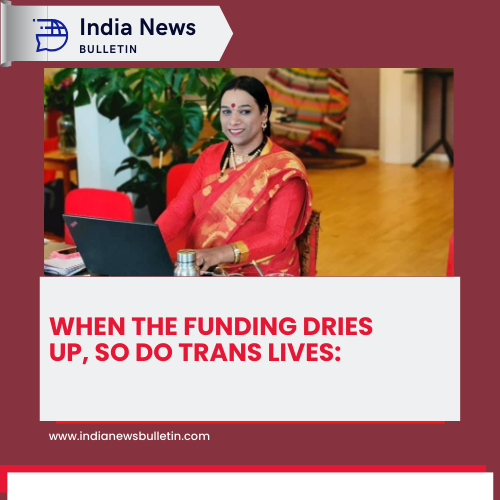By Abhina Aher
For decades, the transgender movement in India has fought tooth and nail for visibility, dignity, and a place at the table. And slowly, inch by inch, we carved that space. With the support of community-led organisations, committed NGOs, and progressive CSR initiatives, we created not just programs—but lifelines. Lifelines that offered employment to peer educators, access to HIV prevention, safe spaces for those thrown out of their homes, and skills training for a better tomorrow.
But today, those lifelines are being quietly snipped.
Across India, trans-led and trans-affirmative programs are shutting down—not because they failed, but because funding vanished overnight. The ripple effect is devastating: hundreds of jobs lost, grassroots healthcare services decimated, and safe spaces shuttered. The gains of decades are being undone in months.
Let’s call this what it is: a humanitarian failure enabled by institutional apathy.
USAID Withdrew, and No One Stepped In
One of the biggest blows came with the exit of USAID, a long-time funder of HIV prevention and community empowerment programs. Their support had enabled trans communities to build sustainable health outreach networks, especially in states with high HIV prevalence. When USAID pulled out, not a single domestic institution—governmental or corporate—stepped in to bridge the gap.
Did anyone ask what happens to the peer educators who were suddenly laid off? Or the trans women who had finally moved out of sex work, now being forced to return just to survive?
The silence has been deafening.
CSR is Playing it Safe—and That’s the Problem
Today’s CSR strategies are driven by visibility. Companies want quick wins and glossy dashboards, so they fund high-visibility sectors like infrastructure, sanitation, or school education. Trans livelihoods? Too “niche.” Too “sensitive.” Too risky for boardrooms still uncomfortable with queerness.
But here’s the truth: there is nothing progressive about inclusion if it excludes the most marginalised.
If corporate India claims to care about diversity, equity, and inclusion, then it must fund the very communities it claims to support—not just during Pride Month, but year-round, and in real terms.
This Isn’t Just About Money—It’s About Survival
This is not merely a story of stalled projects. This is a story of trans lives being pushed back into the margins—into poverty, unsafe work, and trauma. When a skilling program shuts down, it means a trans youth goes back to begging at traffic signals. When a health center shuts down, it means a trans woman with HIV has nowhere to get her medicines or mental health support.
We are not talking about charity. We are talking about infrastructure of survival, painstakingly built and now being dismantled.
What Needs to Happen—Now
We urgently need:
- Domestic funding to fill the vacuum left by global donors.
- CSR policies that prioritise inclusion and earmark funds for trans-led programs.
- Public-private partnerships that go beyond tokenism and put community voices in leadership roles.
- Government incentives for corporates to support LGBTQIA+ livelihoods under social justice schemes.
Above all, we need a shift in mindset. Trans inclusion is not an “extra”—it is integral to India’s development goals.
A Final Word
The trans community is not asking for pity. We are asking for partnership. We are asking for the right to continue the work we were already doing: educating, healing, empowering, and building.
If you are a policymaker, a CSR head, or someone in a position of influence—ask yourself: when the aid stopped, what did I do?
Because when the funding dries up, so do trans lives. And history will remember who looked away.
Disclaimer: The above article is authored by ABHINA AHER, Founder, TWEET Foundation. Views are his personal and do not necessarily reflect the opinion of the organization.
About the Author:
Abhina Aher is the Founder of TWEET Foundation, a trans-led NGO operating in Delhi and Mumbai that supports the transgender community through crisis response, shelter, healthcare, legal aid, and employment opportunities. Under her leadership, TWEET Foundation actively works with government bodies, civil society, and the private sector to drive policy change and advocate for trans rights across India.)

